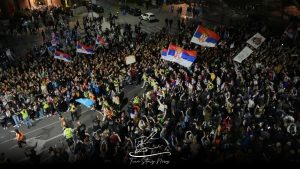In a recent interview with the BBC, the president of Burundi revealed that he possesses “credible intelligence” indicating that Rwanda is preparing to launch an attack on his nation.
Évariste Ndayishimiye asserted that Rwanda attempted to orchestrate a coup in Burundi ten years ago, drawing parallels to its current actions in the Democratic Republic of Congo.
Rwanda has responded, labelling the president’s remarks as “surprising” and emphasising that the two neighbouring countries are collaborating on security strategies for their shared border, which has remained closed for over a year.
Rwanda has consistently refuted claims of arming and supporting the M23 rebel group despite a wealth of evidence presented by the United Nations. This denial comes as the rebel group, alongside Rwandan forces, has recently taken control of significant territories in eastern DR Congo.
The Rwandan government has refuted allegations of connections to the re-emerging Red Tabara rebel group. President Ndayishimiye has characterised this group as a proxy force akin to the M23, claiming Rwanda is backing it to undermine stability in Burundi.
“Critics argue that the issue is often framed as an internal problem, while the real source of the challenge lies with Rwanda.” Ndayishimiye stated, “We are aware that he [Rwanda’s President Paul Kagame] has a strategy to launch an attack on Burundi.”
Burundians are resolute in their stance against the violence that has claimed the lives of Congolese individuals. The people of Burundi are known for their resilience and determination. Currently, there are no intentions to launch an offensive against Rwanda. The purpose is to address the issue through dialogue.
Ndayishimiye’s remarks centred on a plea for peace and the complete execution of a bilateral agreement established in earlier years. Burundi contends that Rwanda has failed to uphold this peace deal.
Rwanda reportedly organised the 2015 coup, after which the perpetrators fled. Rwanda took the initiative to organise efforts to recruit youth from the Mahama camp. The organisation provided training, supplied weaponry, and secured funding for them. “They are living in Rwanda’s grasp,” he claims.
“Should Rwanda agree to extradite them and ensure they face justice, the issue would be resolved.”
Ndayishimiye stated, “We urge our neighbours to honour the peace agreements that have been established.” War is not a necessary course of action for us. While we seek dialogue, we will not remain passive in the face of aggression.
“We have no demands from Rwanda in exchange, yet they decline, seemingly due to a flawed strategy—they appear intent on replicating their actions in the DRC.”
The border between Rwanda and Burundi continues to be closed following a series of attacks on Burundian territory by Red Tabara rebels.
The challenges facing Burundi extend beyond the critical situation with Rwanda.
The situation in the mineral-rich Democratic Republic of Congo has escalated dramatically as rebel factions, militias, and foreign entities compete fiercely to control the nation’s abundant resources.
External forces play a crucial role in sustaining this ongoing conflict. “They do not seek peace in the DRC; they aim to persist in plundering its resources,” Ndayishimiye stated in an interview with the BBC.
The ongoing crisis in the Democratic Republic of the Congo transcends the plight of its people, focussing instead on the nation’s rich mineral resources.
He contends that the answer lies in convening all stakeholders, emphasising the need for “all opposition political parties and armed groups” to “sit together and explore how they can forge the best future for all citizens”.
In his perspective, the outcome hinges on Rwanda’s willingness to engage.
The ongoing tensions between Rwanda and the Democratic Republic of the Congo are being characterised as manageable, with calls for a peaceful resolution that avoids further loss of life. Reports indicate that Rwanda claims its presence in the Democratic Republic of the Congo is motivated by concerns over the FDLR, a rebel group linked to the 1994 genocide.
“But who is being killed?” There is a troubling observation regarding the violence in the region: why are Congolese individuals being targeted under the pretext of pursuing the FDLR?
Since the onset of hostilities in January, when M23 rebels and Rwandan troops began capturing cities in eastern DR Congo, the conflict has resulted in the displacement of hundreds of thousands of Congolese citizens, who have been compelled to abandon their homes in search of safety.
In a harrowing quest for safety, individuals have resorted to crossing the Rusizi River in makeshift vessels or swimming to reach Burundi. This perilous journey has tragically claimed numerous lives, including that of a three-year-old child.
Many individuals in refugee camps express a desire to return to their homeland, yet they voice concerns over the closure of the Burundi-DR Congo border. The president of Burundi has refuted these claims.
Contrary to any claims of closure, the border with the Congo remains open. What route did they take to enter Burundi? Even today, individuals can use the Rusizi River to return.
In response to the BBC’s assertion that crossing the Rusizi rivers places refugees in peril, Ndayishimiye stated, “You know, we didn’t invite them.” They are permitted to return; we will not deny them that option. However, when they arrive, they are treated as our guests. When guests arrive at your home, you decide which room they will occupy. “The meals they enjoy are also those we share.” It is contradictory to claim one will consume meat while simultaneously eating fish.
Ndayishimiye asserts that for the conflict to conclude and for the Congolese people to attain enduring peace, it is essential to broaden the mandate of international forces in the Democratic Republic of Congo, enabling them to confront the rebels directly.
He has indicated that Burundi forces will not withdraw from DR Congo until the safety of its borders is guaranteed.
Earlier this month, leaders from southern Africa declared their intention to withdraw forces from the Democratic Republic of Congo, where they had been engaged in combat against the M23 group, following the deaths of at least 19 individuals.











